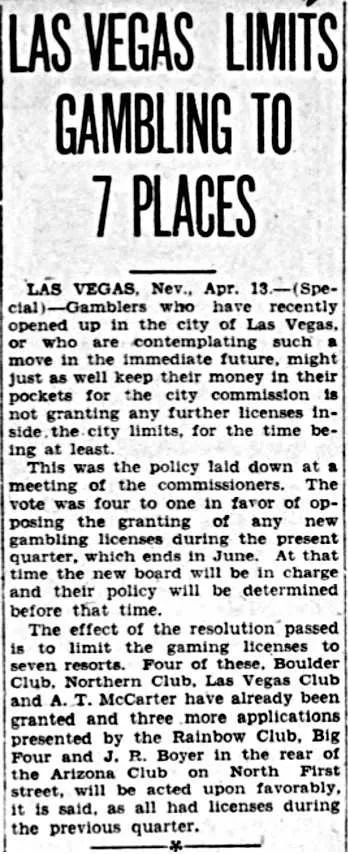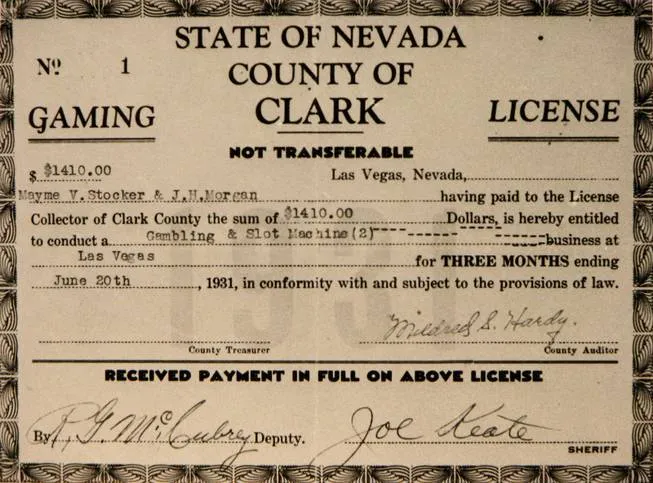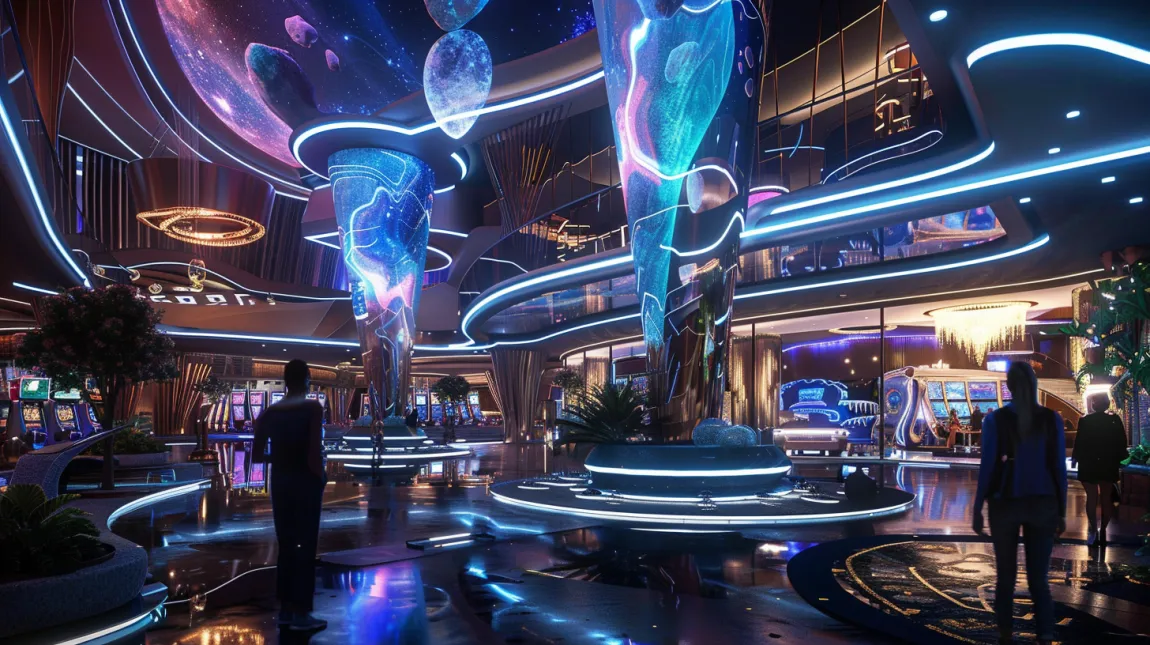Casinos have been a cornerstone of entertainment and gambling for centuries, with their origins dating back to ancient civilizations. However, it wasn’t until the 20th century that casinos truly took form and became the iconic institutions we know today. And when we think of casinos, one name stands out above all others – Las Vegas.
In this article, we will take a trip down memory lane and explore the evolution of casinos, starting from the very first in Las Vegas to the modern day marvels that continue to attract millions of visitors each year. Our main keyword for this article is https://playtoday.co/blog/guides/what-was-the-first-casino-in-las-vegas/ – a question that many have asked but few truly know the answer to.
So buckle up and get ready to learn about the history, development, and future of casinos as we delve into this fascinating world.

1. The Birth of the First Casino in Las Vegas
1.1 A Desert Oasis Turns into a Gambling Mecca
Las Vegas, Nevada – a name that conjures up images of bright lights, glitz, and glamour. But before it became the entertainment capital of the world, Las Vegas was nothing more than a small desert oasis. In fact, it wasn’t until the early 20th century that Las Vegas began its transformation into the bustling city we know today.
At the time, Nevada had already legalized gambling, paving the way for the development of casinos. And in 1931, the state passed a law that allowed counties with populations under 50,000 to vote on whether or not to legalize gambling. This opened the doors for small towns like Las Vegas to capitalize on the booming industry.
1.2 The Opening of the First Casino in Las Vegas
On April 3, 1941, the El Rancho Vegas hotel and casino opened its doors, becoming the first official casino in Las Vegas. The man behind this historic establishment was Thomas Hull, a businessman who had previously owned a gambling club in Northern Nevada.
The El Rancho Vegas was located on what is now known as the Las Vegas Strip, a stretch of land that would become home to many of the city’s most iconic casinos. The hotel had 63 rooms and its casino floor featured slot machines, table games, and a bingo hall. It quickly became a popular destination for tourists and locals alike, setting the tone for the development of other casinos in the area.
1.3 The Impact of the First Casino
The opening of the El Rancho Vegas not only marked the beginning of Las Vegas’ journey to becoming a gambling mecca, but it also had a significant impact on the city’s economy. The hotel and casino created job opportunities, attracted tourists, and brought in revenue for the local government through taxes and licensing fees.
Moreover, the El Rancho Vegas set a precedent for future casinos to come, paving the way for the construction of bigger and more extravagant establishments. This led to a steady growth of the city’s tourism industry, which continues to be a major source of revenue for Las Vegas to this day.
2. The Rise of the Mega-casinos

2.1 The Golden Age of Casinos in Las Vegas
Throughout the 1950s and 1960s, Las Vegas experienced a golden age of casino development. The city saw the rise of mega-casinos – massive resorts that combined luxurious hotel accommodations with grandiose casino floors.
In 1955, the Dunes Hotel and Casino opened, featuring a 200-room hotel and a 28,000 square foot casino floor. This was followed by the Sands Hotel and Casino in 1958, which boasted over 700 rooms and a 12,000 square foot casino floor.
By the 1960s, the city’s skyline was dominated by iconic casinos such as the Stardust, Caesars Palace, and the Flamingo, which helped solidify Las Vegas’ reputation as the gambling capital of the world.
2.2 The Emergence of Modern Casinos
The 1970s saw a shift in casino design, with the emergence of modern casinos that featured sleek and contemporary architecture. This new style was spearheaded by legendary casino developer Steve Wynn, who opened his first casino, the Golden Nugget, in 1973.
Wynn’s next project was the Mirage, which opened in 1989 and set a new standard for luxury and extravagance in Las Vegas. It featured a massive casino floor, an artificial volcano, and a white tiger habitat – all of which were unprecedented at the time.
Wynn continued to push the boundaries of casino development with his subsequent projects, including the Bellagio, the Wynn, and the Encore, cementing his status as one of the most influential figures in the industry.
2.3 The Impact of Mega-casinos
The rise of mega-casinos not only transformed the landscape of Las Vegas but also had a significant impact on the global gambling industry. These establishments were no longer just places for gambling, but rather entire entertainment complexes that offered a wide range of amenities and attractions.
Their success sparked a trend of building massive casinos in other parts of the world, such as Atlantic City and Macau. Today, these mega-casinos continue to attract millions of visitors each year and generate billions of dollars in revenue, making them an integral part of the global economy.
3. The Evolution of Casino Games

3.1 From Slots to High-stakes Poker
Casinos have come a long way since the first slot machine was invented in the late 19th century. Today, there is a wide variety of casino games available, ranging from classic slots and table games to high-stakes poker tournaments.
One of the most notable developments in casino games is the introduction of electronic gaming machines, which emerged in the 1960s. These machines revolutionized the industry by allowing players to gamble without having to interact with a dealer or other players.
In the 1970s, casino games also started incorporating elements of skill, with the introduction of video poker machines. This trend continued with the development of modern slot machines, which feature bonus rounds and interactive features that require some level of skill.
3.2 The Rise of Online Casinos
In the late 1990s, the internet became a game-changer for the gambling industry with the emergence of online casinos. These virtual platforms offered players the opportunity to play their favorite casino games from the comfort of their own homes, anytime and anywhere.
Online casinos have since evolved to include live dealer games, which stream real-time footage of a dealer from a brick-and-mortar casino to the player’s computer or mobile device. This has made the online gambling experience more immersive and realistic, bridging the gap between land-based and online casinos.
3.3 The Future of Casino Games
As technology continues to advance, so do casino games. Virtual reality (VR) casinos are already in the works, offering players an even more immersive gambling experience. With VR headsets, players can enter a virtual casino and interact with other players and dealers in a lifelike environment.
Moreover, the use of cryptocurrency in online casinos is also on the rise. This allows for faster and more secure transactions, as well as increased anonymity for players. It is likely that we will see more casinos adopt this form of currency in the future.
4. The Impact of Technology on Casinos
4.1 Smartphones: Transforming the Way We Play
The widespread adoption of smartphones has had a significant impact on the gambling industry. With the majority of people having access to a smartphone, it has become the primary platform for online gambling.
Mobile casinos have made it possible for players to gamble on the go, giving them access to their favorite casino games anytime they want. This has led to an increase in the number of people gambling, as well as higher revenue for online casinos.
Moreover, the use of mobile apps for brick-and-mortar casinos has also become popular. These apps allow players to keep track of their rewards and promotions, as well as make reservations for hotels, restaurants, and shows within the casino.
4.2 Big Data: Revolutionizing Casino Operations
Big data refers to the vast amount of information that is collected and analyzed by companies to gain insights and improve their operations. In the gambling industry, big data is being used to enhance the player experience and optimize casino operations.
By collecting data on player behavior, casinos can tailor their marketing strategies to target specific demographics and offer personalized promotions. This not only helps attract new customers but also keeps existing ones engaged and loyal.
Data analytics is also used to improve casino floor layout, slot machine placement, and game offerings. By analyzing which games are most popular and which areas of the casino receive the most foot traffic, casinos can optimize their operations to increase revenue.
4.3 Virtual Reality: The Next Frontier for Casinos
As mentioned earlier, virtual reality is poised to revolutionize the gambling industry. It has the potential to create a more immersive and interactive casino experience, blurring the lines between land-based and online gambling.
VR technology allows players to enter a virtual casino where they can interact with other players and dealers, making the experience more social. Moreover, VR casinos can offer a wider variety of games without the limitations of physical space, providing players with endless entertainment options.
5. The Impact of Casinos on Society
5.1 Job Creation and Economic Growth
Casinos have a significant impact on the economy, providing job opportunities and contributing to economic growth. In Las Vegas alone, casinos employ over 166,000 people, making it the largest employer in the state of Nevada.
Moreover, casinos generate billions of dollars in revenue each year, which goes towards various forms of taxation, such as property taxes, sales taxes, and gaming taxes. This revenue helps fund government programs and services, as well as support education, healthcare, and infrastructure.
5.2 Tourism and Local Businesses
Tourism is a major source of income for many cities around the world, and casinos play a crucial role in attracting tourists. People travel from all over the world to visit famous casinos and experience the vibrant atmosphere of cities like Las Vegas and Macau.
Furthermore, casinos also benefit local businesses, as visitors often spend money on accommodations, dining, shopping, and entertainment outside of the casino. This creates a ripple effect, boosting the economy and creating more jobs.
5.3 Responsible Gambling and Social Issues
While casinos provide many benefits to society, they also come with their fair share of social issues. One of the biggest concerns is problem gambling, which can lead to financial troubles, relationship problems, and even addiction.
To address this issue, casinos have implemented responsible gambling measures, such as self-exclusion programs, mandatory breaks, and limits on betting amounts. They also contribute to organizations that help those struggling with gambling addiction.
6. The Future of Casinos

6.1 The Rise of Integrated Resorts
Integrated resorts are multi-purpose complexes that combine luxury hotels, entertainment venues, convention centers, restaurants, and casinos into one large development. These resorts have been popular in Asia for several years and are now gaining traction in other parts of the world.
These mega-complexes aim to attract a wide range of visitors, including families, business travelers, and gamblers. They offer a diverse range of attractions and activities, making them an all-in-one destination for entertainment and leisure.
6.2 The Potential of Online Casinos
The rise of online casinos has been steady over the past two decades, and it shows no signs of slowing down. With advancements in technology, online casinos will continue to evolve and provide players with an even more immersive and realistic gambling experience.
In addition, as more countries legalize online gambling, the market for online casinos is expected to expand, providing further opportunities for growth and innovation.
6.3 The Integration of Blockchain Technology
Blockchain technology has the potential to revolutionize the gambling industry by providing a more secure and transparent platform for transactions. By using smart contracts, casinos can guarantee fair play and timely payouts, which is a major concern for many players.
Moreover, the use of cryptocurrencies in online casinos is expected to increase, offering players faster and more secure transactions with lower fees compared to traditional methods.
Conclusion
Casinos have come a long way since the first one opened its doors in Las Vegas in 1941. From humble beginnings, they have evolved into massive resorts that attract millions of visitors each year and contribute significantly to the global economy.
With advancements in technology, the future of casinos looks promising, with virtual reality, big data, and blockchain technology set to transform the industry even further. While there are concerns about the social impact of casinos, responsible gambling measures and contributions to support organizations show that the industry is taking steps towards minimizing these issues.
So whether you prefer the glitz and glamour of Las Vegas or the convenience of online gambling, one thing is for sure – the evolution of casinos is an ongoing journey that will continue to shape the world of entertainment and gaming for years to come.